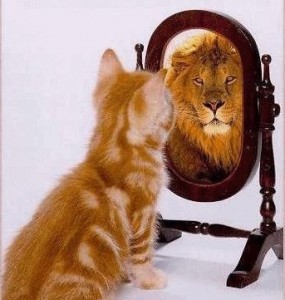George Kelly: Do you see what I see?
George Kelly had quite an adventurous childhood and young adulthood. His life consisted of multiple moves, schooling in a one-room school, tutoring from his parents, attendance to four different high schools, giving speech classes to immigrants wishing to become U.S. citizens, becoming a member of the Navy in World War II, and living during the Great Depression. It is interesting also to note that at one point Kelly taught drama. His life was filled with many different roles and opportunities. Then, once the Great Depression hit, he gained a passion for psychology. He desperately wanted to help all of the troubled people. And shortly after, he got the opportunity to do so. Kelly began working with students and teachers both, and they all experienced a variety of emotional problems. Because Kelly didn’t have an extensive background in psychology nor was he trained in any therapeutic approaches, “he began to experiment with a variety of approaches, and he discovered that anything that caused his clients to view themselves or their problems differently improved the situation” (p. 545). This is why I would argue that George Kelly informs us about redemption. In his theories, I see hope. In his theories, I see a glimpse of a brighter future.
One thing I really like about Kelly is that, yes, he recognizes human fault. He sees the “fall” of humans. He recognizes emotional disturbances, limitations on human perspectives, and different ways humans process events and situations. But, Kelly doesn’t think we have to stay there. He thinks if we can just begin to see ourselves differently, if we can continue to play “make-believe” as adults, then we can pull ourselves out of the pits. Kelly’s therapeutic approach reflected his belief that psychological problems are largely related to perceptual problems, meaning the goal of therapy is to help the client view themselves and situations differently. I love this quote by Kelly:
We take the stand that there are always some alternative constructions available to choose among in dealing with the world. No one needs to paint himself into a corner; no one needs to be completely hemmed in by circumstances; no one needs to be the victim of his biography.
We don’t have to play the victim, and because of that I see freedom, hope, and redemption.




Jacey Ferrara on Therapy and Restoration
2:55 pm, 12.03.13
Anna, I can definitely see how you would place Rogers in the category of restoration. I think I would probably place him there, too! Rogers was really big on client-centered therapy, and he was very adamant about listening to what they need. I do see the association between Rogers and redemption because, like you mentioned, Jesus allows us to come to Him daily. I am constantly casting my cares upon the Lord. I am constantly learning, growing, and therefore being convicted of my sinful nature. But, because Jesus loves that I go to Him, even when I mess up, there is redemption and hope and ever-changing transformation. I think Rogers does this for his clients as well. He allows them to be, as they are, and then provides a safe place to reveal things to them and help them transform their lives and thinking. Anyways, you had me thinking! Thanks!
Jacey Ferrara on Maslow, Self-Actualizing, and Creation
2:49 pm, 12.03.13
Maddy, I like the position you took on this post. What has come to be very obvious over time is that there are different personalities and temperaments in this world, and God created it that way. Each personality and temperament has strengths and weaknesses and God made us different for a reason! If everyone was like me, things would never get done or it would be done very sloppily and last minute! I just really like how you connected the desirable characteristics Maslow discusses with God. And I do believe, regardless of whether or not Maslow considered you to be “above the average man,” there is always God-given and intended purpose for those who grab hold of Him and His truths.
Jacey Ferrara on Man's Fork In The Road
2:32 pm, 12.03.13
Nicole, I really enjoyed your post! I find Frankl fascinating, and I like how you connected him both with the fall and with redemption. When man doesn’t find purpose or hope, that definitely gives insight into the Fall of man and the deception of this world. At the same time, Frankl also talks about the ability of man to choose and find meaning in life, which definitely speaks to redemption. I also appreciate Jessica’s response! Although we have not suffered as a Holocaust victim as Frankl did, we have the ability to make daily choices. Especially as Christians we can choose to speak life, hope, love, and joy in the midst of difficult situations.
Jacey Ferrara on Creation - John B. Watson
9:36 am, 11.18.13
D.J., such a thought provoking post. It’s amazing that experiences can actually dictate how we feel about something. Sometimes feelings can be great and loving and compassionate, and sometimes those feelings result in a lot of fear, anger, frustration, jealousy, etc. I can definitely see how this lead you to think about spiritual warfare. Woah, my mind was kind of just blown. I really like this perspective. And I also love what Irene and Rebecca said!
Jacey Ferrara on McDougall and Creation
9:33 am, 11.18.13
Nicci, I love your post! I find McDougall really interesting! And I love the way your post engaged my understanding of him and what he contributed to psychology… this idea of purposive behavior! I think that is something we can fail to analyze in ourselves sometimes actually. Why did I just act the way I did? Well, maybe it doesn’t have EVERYTHING to do with how I was raised or what was modeled, maybe it has to do also with what I’m after. Is it power? Authority? Recognition? This is something I could think about for hours. Also, this purposive behavior reminded me of personality types: Popular Sanguine, Powerful Choleric, Peaceful Phlegmatic, and Perfect Melancholy. We have these temperaments and sometimes those can be referred to as why we might have tendencies to act or feel a certain way. I also LOVE your connection to God, our Creator. Definitely, I can see how purposive behavior relates to a God who intended and designed us specifically with Heavenly desires, motivations, and attitudes. Awesome post, I really enjoyed it!
Jacey Ferrara on Behaviorism as Creation
8:50 am, 11.18.13
Matt, I agree that behaviorism can teach us about creation. In one sense behaviorism is trying to identify why we are wired the way we are based on our experiences, reinforcement, etc. I do think that informs us of the way we are created. I can also see how behaviorism is related to maybe new hope/new creation in a therapy setting. Behavior therapy attempts to change certain behaviors and attitudes and it can help transform someone’s life. I’m glad your post on behaviorism! I think it’s fascinating. Thanks!
Jacey Ferrara on Pragamatism as a Redemptive idea
5:07 pm, 11.04.13
Matt, I like the way you wrote about Pragmatism. I can see how this is a difficult topic to place into a category, but I think you did a great job of discussing and defending the various categories. I also really liked how you connected William James’ personal life and his use of pragmatism to redemption. I think that puts a positive spin on pragmatism and it obviously gave William James hope and encouragement to continue working and living his life.
Jacey Ferrara on Munsterberg and community
5:04 pm, 11.04.13
Zach, great post!!! I love that you took this outside the box! I love that Munsterberg informs us more about the value of working together, and the efficiency and power community holds. If you had to place these under a category, I would lean towards saying restoration and new creation because of Jesus’ resurrection, we can have common community. We can be brothers and sisters in Christ and we can learn to use the gifts the Holy Spirit grants us! Awesome.
Jacey Ferrara on Freud In All Categories
5:01 pm, 11.04.13
Caroline, I like the thoughtfulness of this post! There are so many things we can examine about Freud, and I think you did a good job of touching on different things he contributed to. One thing I’ve always found interesting is the id, superego, and ego. It seems like Freud is one of the first people to try and pin point and write down the inner human… the part of us we all deal with. I think we all have the two sides battling inside of us and it’s interesting that Freud tries to narrow this down and put a name to it. It’s like with any decision I make… Do I work out? One part of me says yes, it helps you maintain health, strength, stamina, and releases endorphins. The other part of me says no, it will be hard, just lay down, sleep, do something more relaxing for yourself! Needless to say, your post has me thinking! Thanks! 🙂
Jacey Ferrara on Creation – Understanding the Human
5:34 pm, 10.21.13
Denysha,
I also really like this time period! These philosophical ideas remind me a lot of Creation because it seems most philosophers are really just trying to figure out more about the human body and mind. They aren’t necessarily looking for how awful we suck and how we can be fixed.. it seems they are really just tapping into questions such as how does the human body even work? What all does the human body contain? What are its abilities and functions and how do those things work together or separately? I also am a fan of anything that teaches us about kinesthesis because I am a very intense kinesthetic learner! I have to stand up or lay on the floor most of the time in order to stay focused on any tasks, so I appreciate the development and understanding of kinesthesis! For a long time I didn’t understand why I had such strange tendencies so I am grateful for Weber’s questions and the things he begins to examine!